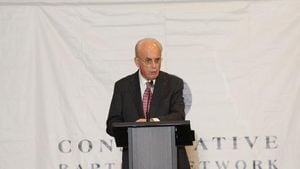The University of Sussex has been fined £585,000 by the Office for Students (OfS) for failing to uphold freedom of speech. This unprecedented fine marks the conclusion of a three-and-a-half-year investigation into the university's handling of the case of Professor Kathleen Stock, who resigned in 2021 amid protests and accusations of transphobia related to her views on gender identity and biological sex.
The OfS's investigation revealed that the university's Trans and Non-Binary Equality Policy Statement contained elements that potentially led to a chilling effect on free speech. The policy required course materials to "positively represent trans people" and stated that "transphobic propaganda [would] not be tolerated." Such language, according to the OfS, could cause both staff and students to self-censor, fearing disciplinary action for expressing lawful views.
During the investigation, the OfS found no evidence that Professor Stock had engaged in unlawful speech while at the university. However, it concluded that the university's management and governance processes were inadequate, which contributed to an environment where academic freedom was not adequately protected.
In a statement, Arif Ahmed, the OfS director for freedom of speech and academic freedom, highlighted that the university's failings had serious implications for both staff and students. "Free speech is a fundamentally important aspect of our successful and vibrant higher education sector," he said. "All universities and colleges have a duty to protect academic freedom and to take steps to secure freedom of speech within the law." Ahmed emphasized that the OfS had found significant breaches of its requirements, making the fine appropriate given the scale of the wrongdoing.
Professor Sasha Roseneil, vice-chancellor of the University of Sussex, voiced strong opposition to the OfS's findings, describing them as an "unreasonably absolutist definition of free speech." She argued that the ruling would leave universities powerless to prevent abusive, bullying, and harassing speech, effectively perpetuating what she termed the "culture wars." Roseneil announced that the university plans to legally challenge the OfS's findings, asserting that the investigation lacked substantive engagement with university staff.
The OfS's investigation was prompted by protests that erupted on campus after Professor Stock published a book questioning the significance of gender identity compared to biological sex. These protests included calls for her dismissal, and Stock reported receiving death threats as a result of her views. She described her experience at Sussex as a "surreal anxiety dream," reflecting the intense pressure and hostility she faced.
In response to the fine, Education Secretary Bridget Phillipson reiterated the importance of free speech and academic freedom in universities, stating that these principles are "non-negotiables." She emphasized that students must be prepared to engage with uncomfortable truths and that the government is committed to ensuring that universities uphold these values.
As part of the OfS's regulatory framework, the fine issued to Sussex is the largest ever imposed on a university for such violations. The regulator's decision comes at a time when the government is considering strengthening the powers of the OfS to ensure that freedom of speech is upheld across higher education institutions.
The university's leadership has expressed concern that the ruling sets a dangerous precedent for higher education in the UK. Roseneil warned that the OfS's findings could hinder universities' ability to manage cultural tensions on campus and protect students from harmful propaganda. She stated, "Under this ruling, we believe that universities would not be permitted to expect their staff and students to treat each other with civility and respect. The OfS is effectively decreeing libertarian free speech absolutism as the fundamental principle for UK universities."
Stock, who is now a founding fellow at the University of Austin, a new institution aimed at supporting academics who feel marginalized for their views, has been vocal about her experiences. She has expressed reluctance to return to a British university, citing a hostile environment for those holding gender-critical views.
The OfS's investigation also found that Sussex may not have complied with various legal obligations concerning freedom of speech, including the 1986 Education Act and the European Convention on Human Rights. The regulator noted that decisions regarding free speech and equality matters were often made by individuals without the proper authority, which further complicated the university's governance.
The implications of this ruling extend beyond the University of Sussex. Critics of the OfS's findings argue that they could embolden individuals to engage in harmful speech without fear of repercussions, as long as that speech does not violate the law. This has raised concerns among advocates for academic freedom who fear that the balance between protecting free speech and safeguarding individuals from harassment may be jeopardized.
As the University of Sussex prepares to challenge the OfS's ruling, the broader conversation about free speech in academia continues to evolve. The case of Professor Kathleen Stock has become emblematic of the tensions surrounding gender identity, academic freedom, and the responsibilities of educational institutions to create inclusive environments while respecting diverse viewpoints.
The outcome of this legal challenge could have lasting effects not only on the University of Sussex but also on universities across the UK as they navigate the complexities of free speech and academic governance in an increasingly polarized environment.








